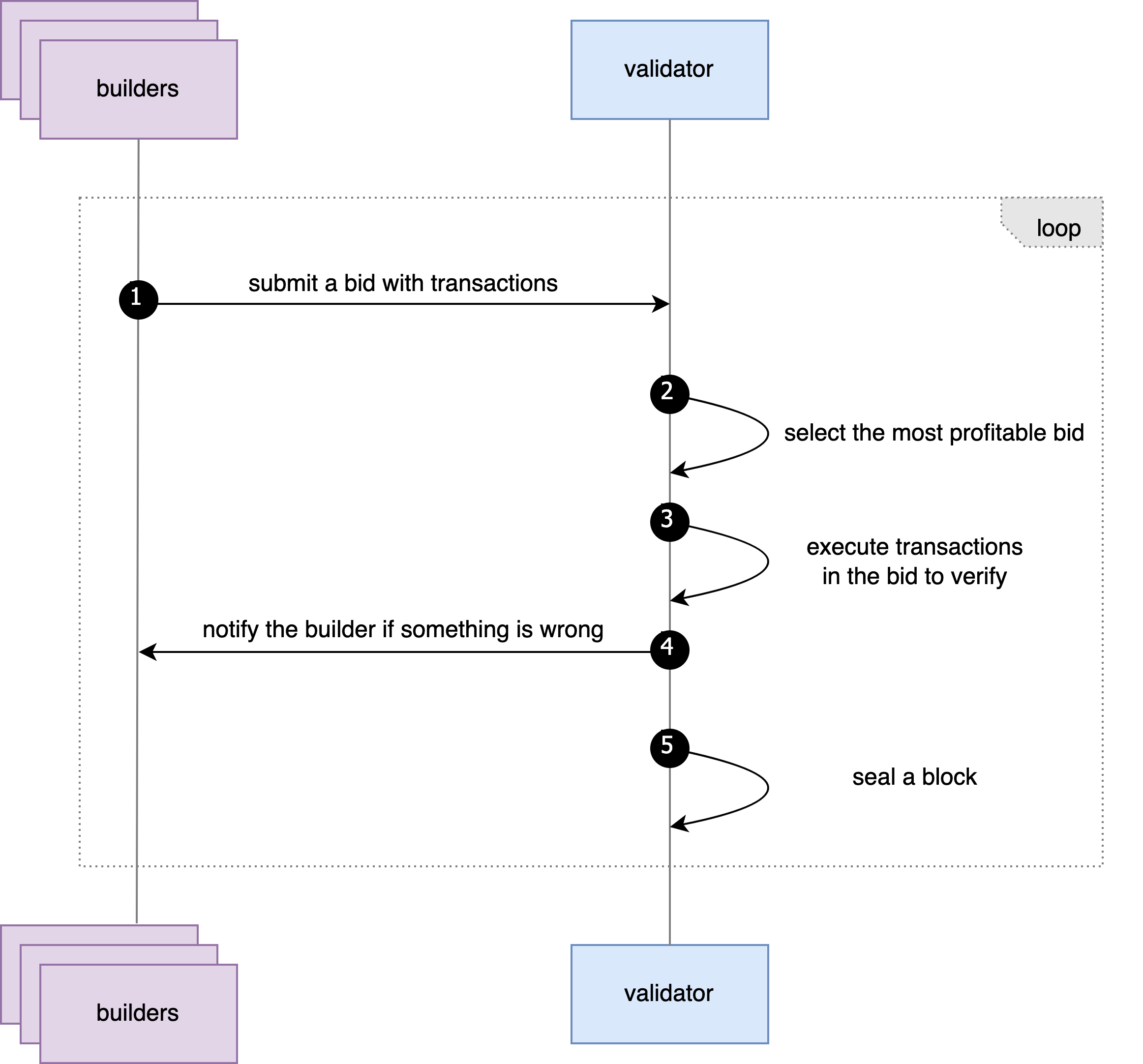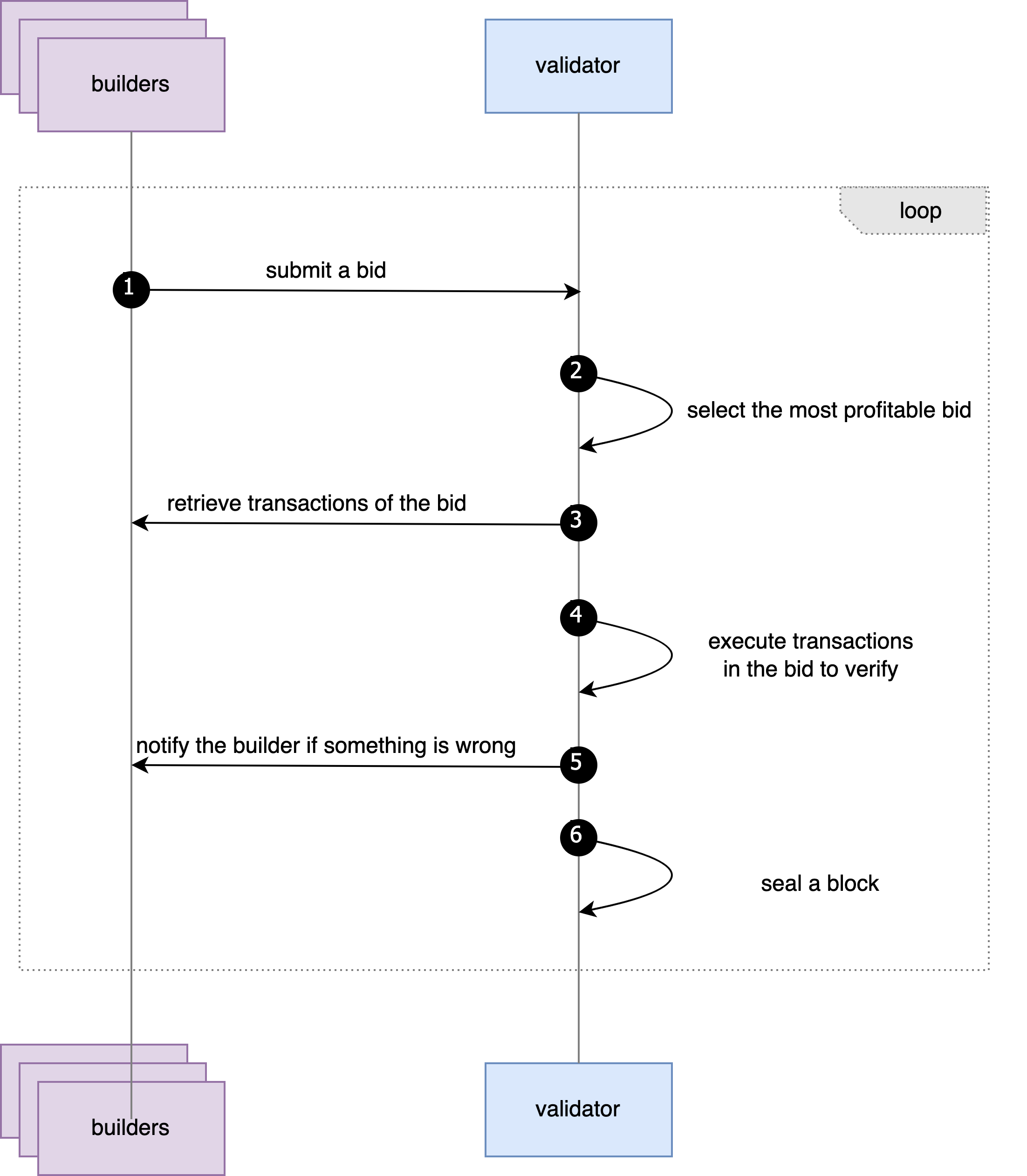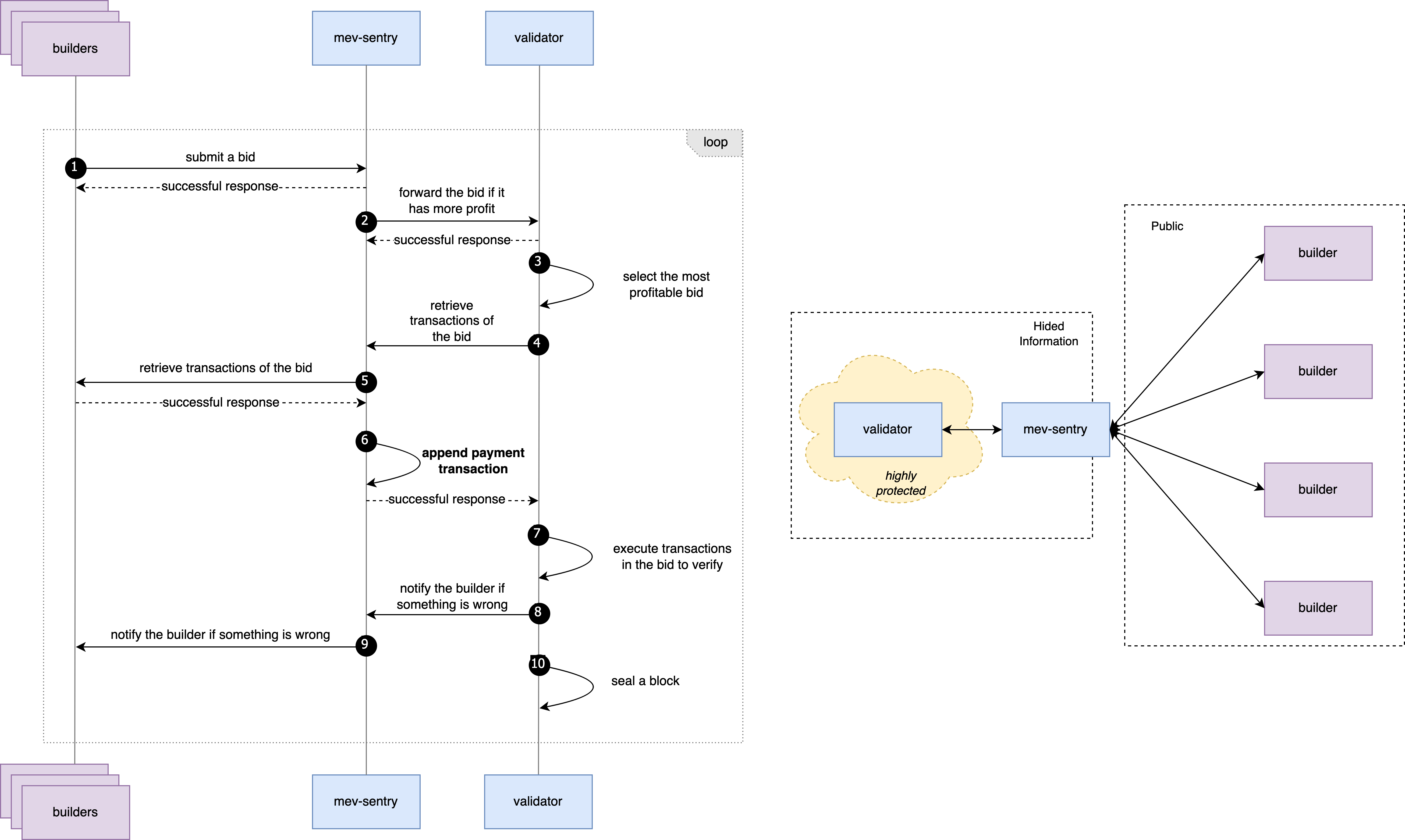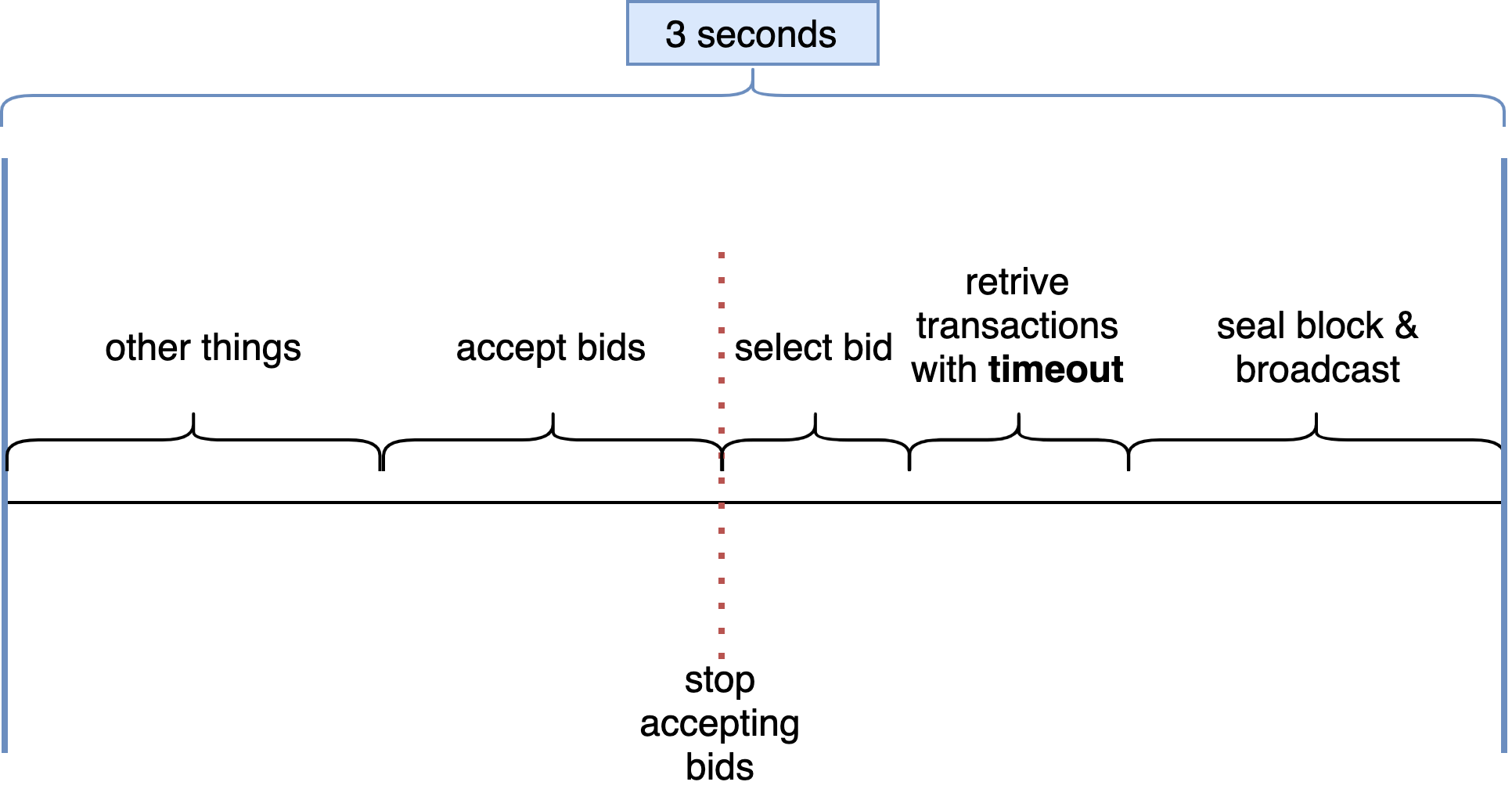BEP: 322 Title: Builder API Specification for BNB Smart Chain Status: Candidate Type: Standards Created: 2023-11-15
- BEP-322: Builder API Specification for BNB Smart Chain
This BEP introduces a suite of interaction processes and API specifications to establish a fairer and more transparent MEV framework on the BNB Smart Chain. Participants can follow this specification to collaborate on building and proposing blocks.
The Ethereum MEV market is thriving, with the Ethereum Builder API Specification widely supported by mainstream consensus clients. As of October 2023, the inclusion rate of blocks from builders is approximately 90%.
The BNB Smart Chain MEV market still remains at a Wild West stage. The absence of PBS adoption results in a chaotic landscape with different architectures and API standards. Nowadays, it is very challenging for validators to to integrate with multiple MEV providers. Moreover, the absence of native support from the BSC clients further exacerbates the instability of MEV services. To tackle these issues, this BEP proposes compliant guidelines and standards with the following aims:
-
Improve Stability: Unified specifications for both validators and MEV providers to enhance integration and stabilize the market.
-
Improve Economy: A unified architectural specification increases speculators' costs, fostering a healthy market competition. Validators can extract more value by integrating with multiple MEV providers, which benefits delegators as well.
-
Improve Transparency: This specification aims to bring transparency to the BSC MEV market, exposing profit distribution among stakeholders to the public.
Before diving into the specification, let's analyze the BSC trust model and its distinctive consensus protocol.
Validators in the BNB Smart Chain are considered more trustworthy, as it requires substantial BNB delegation and must maintain a high reputation. This stands in contrast to Ethereum, where becoming an Ethereum validator is much easier. As of the end of 2023, there were approximately 40 validators on BSC (with more expected to join) and a total of 20 million BNB staked. In Ethereum, the barrier to becoming a validator is very low (i.e., 32 ETH), leading to over 800,000 Ethereum validators according to Nasdaq.
Meanwhile, in the Ethereum PBS architecture, the 'relay' role is expected to be trusted by both builders and validators. However, in BSC, validator misbehavior results in reputation damage and un-delegations, reducing the need for introducing another trusted role. In this specification, we eliminate the 'relay' role. However, this adjustment should not compromise the security and trust model for the MEV market between builders and validators.
In Ethereum, a block header is transferred from a builder to a validator for signing, allowing the block to be broadcasted to the network without disclosing the transactions to the validator. In contrast, in BSC, creating a valid block header requires executing transactions and system contract calls (such as transferring reward and depositing to the validator set contract), making it impossible for builders to propose the whole block.
-
Builder: the party that specializes in the construction of BSC execution payloads using transactions received from searchers and p2p network (trusted by searchers and users for fair inclusion).
-
Proposer: the party that signs and submits a block to the network, referred to as the validator.
-
Mev-sentry: the party that runs in front of a validator to proxy requests and enhance network security.
-
Bid: used by a builder to do competitive bidding for a block space. A bid should include the following information:
- block_number. The height of the block.
- parent_hash. The hash of the parent block.
- gas_fee. The total gas fee of the bid.
- gas_used. The total gas used of the bid.
- builder_fee. The fee that the builder would like to take from the validator.
- txs. The transaction list in the bid(optional).
- signature. The signature of the bid.
Builders and validators collaborate to propose blocks during each block production interval. Two interaction options exist between them: one-round and two-round. With one-round, builders include transactions with their bids, allowing validators to immediately seal a block without additional transaction retrieves. One-round is the default option for trusted relationship.
- Builders submit bids with transactions to the in-turn validator.
- The validator picks the most valuable bid from all received within a predefined time.
- The validator executes the full transactions and verifies the bid (gas received is the same as what claimed in the bid).
- If the bid turns out to be invalid, the proposer will use other bid or a locally mined block and also report detailed errors to the builder. The validator may blacklist the builder for some time or forever if the builder offers invalid bid.
- The validator seals the final block.
In practical settings, opting for a One-round with MEV-Sentry (optional) configuration stands out as the optimal solution for ensuring both security and efficient payment processes. Subsequently, we will delve into the specific role that MEV-Sentry can fulfill in the upcoming section.
Two-round interaction involves builders sending bids without transactions initially. If selected, validators retrieve transactions through another RPC call before sealing the block. The two-round process is considered more time-consuming compared to the one-round interaction. It's suggested to adopt two-round interaction for builders who do not fully trust validator and are not concerned about the additional latency caused by one extra round of communication.
- Builders submit bids without transactions to the in-turn validator.
- The validator picks the most valuable bid from all received bids within a predefined time.
- The Validator asks the builder for corresponding transactions related to the chosen bid, and also gives the builder its signature as a receipt. The builder should return the full list of transactions.
- The validator executes the transactions and verifies the bid (gas received is the same as what is claimed in the bid).
- If the bid turns to be invalid, the proposer will use other bid or a locally mined block and also report detailed errors to the builder. The validator may blacklist the builder for some time or forever if the builder offers invalid transactions.
- The validator seals the final block.
There are some edge cases should be elaborated:
-
If there is no profitable bid compared to local work, the validator should use locally mined block.
-
In two-round interaction, if the validator cannot receive the full list of transactions before timeout, the validator should use the locally mined block too, and 1) notify the builder using issue report API; 2) blacklist the builder for a while or even forever.
-
If a builder finds that its transactions are stolen by a validator, the builder should 1) refuse to send bids to the validator, 2) disclose the steal to public channels for social influences if necessary.
Two-Round with MEV-Sentry(optional) interaction:
A MEV-Sentry can be used for validators to provide several functionalities. The sentry has its own wallet, which should be different from the validator's consensus wallet, and append a transfer transaction to send builder fee. It can also filter bids and only forward the more profitable ones to a validator. Meanwhile, a validator needs to interact with many builders at the same time, sentry helps to hide the validator’s real IP information and protect against DDoS and other threats. Therefore, it is highly suggested for validators to run such a layer in front of itself in production.
After introducing the overall interactions, we would like to highlight some main differences between Ethereum Builder Specification here for the readers who are familiar with it.
-
As mentioned in the background, the BSC trust model and consensus are different from Ethereum, it is justifiable for builders to send transactions to validators after receiving the receipt signature. In case a builder finds a validator stealing transactions, it can 1) not submit bids to evil validators anymore, 2) reveal evidence to the public channels (e.g., Discords, Github, blogs) for social influence.
-
In Ethereum, the fee settlement between builders and validators is conducted using the 'coinbase' reward (for reward to builders) and token transfer (for the fee to validators). In BSC, the coinbase reward will be transferred to the system contract for later distribution to all delegators. A different way is proposed in this proposal, a validator can run an MEV-Sentry to append a transfer transaction for payment. It will be further discussed in the later section.
The following APIs are introduced on Builder and BSC client sides, to implement the aforementioned workflows. The full specification of these APIs are defined in a repo with swagger and smart contracts.
The following APIs should be implemented on Builder.
This api is used by the validator to ask for full transactions once a builder's bid is chosen. The request body will be treated as a receipt for payment settlement.
Request:
{
"jsonrpc": "2.0",
"method": "mev_retrieveTransactions",
"params": [
{
"bid": {
"block": "the block number",
"parentHash": "the hash of the parent block",
"gasFee": "the total gas fee of the bid",
"gasUsed": "the total gas used of the bid",
"builderFee": "the fee that the builder would like to take from the validator"
},
"signature": "the signature of the bid"
}
],
"id": 1
}Response:
{
"jsonrpc": "2.0",
"result": {
"bid": {
"block": "the block number",
"parentHash": "the hash of the parent block",
"gasFee": "the total gas fee of the bid",
"gasUsed": "the total gas used of the bid",
"builderFee": "the fee that the builder would like to take from the validator",
"txs": [
"the transactions in the bid"
]
},
"signature": "the signature of the bid"
},
"id": 1
}This API is used to report issues to a builder. For example, if a validator finds that a builder's transactions are invalid or the transaction API is timeout-ed, a validator can notify the builder.
Request:
{
"jsonrpc": "2.0",
"method": "mev_reportIssue",
"params": [
{
"validator": "validator address",
"bidHash": "hash of the bid",
"error": {
"code": -38001,
"message": "response message"
}
}
],
"id": 1
}Response:
{
"jsonrpc": "2.0",
"result": null,
"id": 1
}The following APIs should be implemented on the validator side or BSC clients.
This API is used by the builder to submit its bid for the current block production. In general, a proposer will use the
gas_fee and builder_fee_value (profit = gas_fee * validator_commission_rate - builder_fee_value) to find the most
profitable bid.
Request:
{
"jsonrpc": "2.0",
"method": "mev_sendBid",
"params": [
{
"bid": {
"block_number": 123456,
"parent_hash": "the hash of the parent block",
"txs": [
"the transactions in the bid"
],
"gasUsed": 100,
"gasFee": 100000000000,
"builderFee": 100000000000
},
"signature": "the signature of the bid"
}
],
"id": 64
}Response:
{
"jsonrpc": "2.0",
"id": 64,
"result": "the hash of the bid"
}or some error:
{
"jsonrpc": "2.0",
"id": 64,
"error": {
"code": -38005,
"message": "the validator is not in-turn to propose currently, try again later"
}
}With a shorter block time of 3 seconds in BSC compared to Ethereum's 12 seconds, designing for time efficiency becomes crucial. Validators must set a cut-off time to stop receiving new bids, and a timeout to retrieve transactions from the winning builder. To be more flexible, validators can choose to run a node with or without support for builders, so a switch should be considered to turn on/off the feature based on its choice.
On the BNB Smart Chain, the block reward will be transferred to a system contract by consensus engine and distributed to delegators and validators based on the staked amount every day. This distribution mechanism is also applicable to MEV income. Without changing bsc consensus rule, the following approaches can be taken for payment
or the payment from users to builders,both off-chain and on-chain solutions can be considered:
-
Users can subscribe to builders' service. For example, users can pay builder service every month based on different levels of prices.
-
Users can insert a transfer transaction into his/her bundles to pay the builder.
For the payment between builders and validators:
-
A validator can run a proxy and append transfer transactions to pay builders. If a validator does not append the transfer transaction, a builder can still use the receipt (with the validator’s signature) to ask for settlement using other approaches.
-
A validator and a builder can negotiate other off-chain and on-chain approaches that are out of the scope of the specification.
Furthermore, let's also discuss what will happen if a builder or a validator misbehaves.
-
If a builder wins a bid and does not return the full list of transactions to a validator, the validator can easily detect this and stop service for the builder. Eventually, the builder will get no income from block production and users will also leave the builder.
-
If a validator steals transactions from a builder when there is potential value. The victim builder can detect this. It can stop sending bids to the validator and post evidence (i.e., the signature from a validator) about the misbehavior. The validator will lose the income from the builder and even more builders.
The process for builders to register to validators is not defined in this specification. However, a promising solution is highlighted and suggested–using a smart contract for builder registration.
In BSC, one smart contract can be implemented to provide the following functionalities:
- a validator can register its information (e.g., consensus address, proxy URL) for participation.
- a builder can deposit some amount of BNB for participation.
- a builder can register to validators by providing its information (e.g., builder address).
With this kind of smart contract, builders and validators can discover each other easily. It also provides transparency for all related stakeholders.
The content is licensed under CC0.



